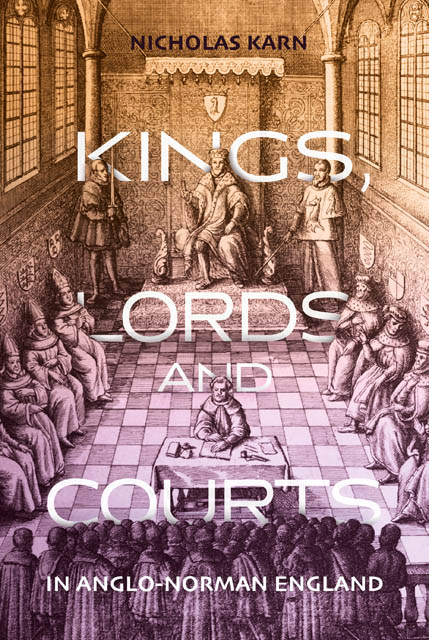Book contents
- Frontmatter
- Dedication
- Contents
- Preface and Acknowledgements
- List of Abbreviations
- Introduction
- 1 Lords and their Dependents in Court: The Later Anglo-Saxon Paradigm
- 2 The Aspirations of Lords in Eleventh- and Twelfth-Century England
- 3 Private Claims and Hundreds in the Later Eleventh and Earlier Twelfth Centuries
- 4 The Division of Hundreds and the Proliferation of Courts
- 5 From Debate within Courts to Debate between Courts: The Origins of Jurisdictional Debate
- 6 Courts, Pleas and Kings in the Early Twelfth Century
- 7 Pleas and Justices in the Early Twelfth Century
- Conclusion
- Appendix: The Evidence for Justices, 1100–54
- Bibliography
- Index
4 - The Division of Hundreds and the Proliferation of Courts
Published online by Cambridge University Press: 18 January 2023
- Frontmatter
- Dedication
- Contents
- Preface and Acknowledgements
- List of Abbreviations
- Introduction
- 1 Lords and their Dependents in Court: The Later Anglo-Saxon Paradigm
- 2 The Aspirations of Lords in Eleventh- and Twelfth-Century England
- 3 Private Claims and Hundreds in the Later Eleventh and Earlier Twelfth Centuries
- 4 The Division of Hundreds and the Proliferation of Courts
- 5 From Debate within Courts to Debate between Courts: The Origins of Jurisdictional Debate
- 6 Courts, Pleas and Kings in the Early Twelfth Century
- 7 Pleas and Justices in the Early Twelfth Century
- Conclusion
- Appendix: The Evidence for Justices, 1100–54
- Bibliography
- Index
Summary
The previous chapter has set out how lords could come into positions of control and influence over hundreds, and how these kinds of interests could be turned into claims. That story is an important one for how jurisdiction developed in the eleventh and twelfth centuries, but it is not the only one. Lords also came to preside over large numbers of courts which had more restricted scope and jurisdiction. These ultimately came to be predecessors of the omnipresent lordship and manorial courts of later medieval England, and of others such as courts leet. These early lordship courts are not well attested in the sources, and theories about their origins often have the quality of a conjecture. Much the most cited theory is that of Frederic Maitland, who suggested that these lesser courts began with their lords and the lands they allowed to their dependents, and so had a distinct point of origin from the hundred and shire; the two kinds of court had separate moments of genesis. Their later history was driven by the need to refine divisions of jurisdiction between lords’ courts and the others. From this starting place with lords, courts proliferated under the influence of kings and their agents, who defined franchise over time and so drove lords to reflect those definitions in the structures of their courts.
This chapter will offer a slightly different model. It will suggest that lords’ courts originated because lords broke parts off from the functions of hundreds. The evidence for this will be set out below, but largely it depends on two kinds of behaviour that can be seen in the eleventh and twelfth centuries. First, there was a trend towards the use of units beneath and within the hundreds. The eleventh-century hundred is an an obscure entity whose history has not yet been written, especially when compared to the vision of the tenth-century hundred that can be reconstructed from the laws. What indications there are suggest that in many parts of England after 1000 the hundred was run in ways not anticipated in the tenth century. In the eleventh century, many hundreds had been divided into lesser units that seem to have been the basis for the functions of the hundred in taxation and other matters.
- Type
- Chapter
- Information
- Kings, Lords and Courts in Anglo-Norman England , pp. 101 - 126Publisher: Boydell & BrewerPrint publication year: 2020



